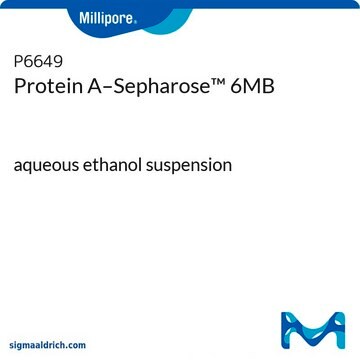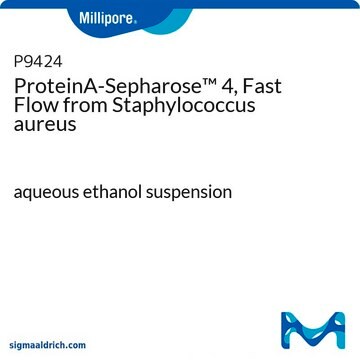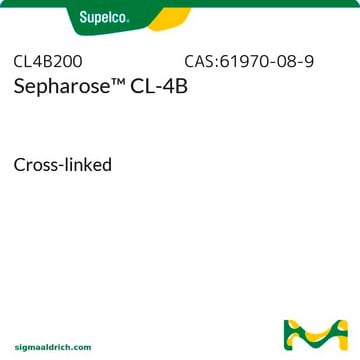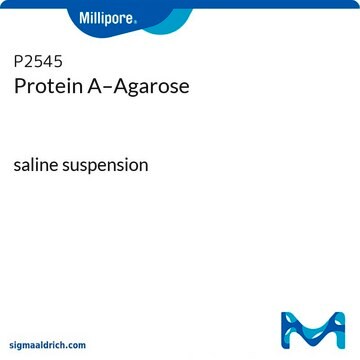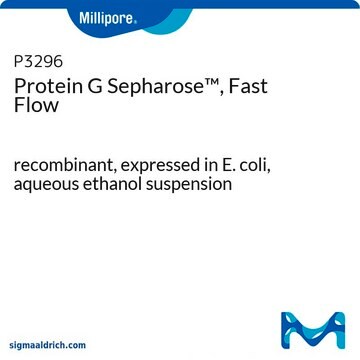P1925
Protein A–Agarose macrobeads
aqueous suspension
Synonym(s):
Protein A resin
Sign Into View Organizational & Contract Pricing
All Photos(1)
About This Item
Recommended Products
form
aqueous suspension
Quality Level
extent of labeling
~6 mg per mL
matrix activation
cyanogen bromide
matrix spacer
1 atom
capacity
~6 mg/mL binding capacity (human IgG)
storage temp.
2-8°C
Looking for similar products? Visit Product Comparison Guide
General description
Protein A is an immunoglobulin (Ig)-binding protein that might be suitable for low-pressure antibody isolation. It is used to purify large amounts of IgG and binds to the Fc part of the antibody at the CH2–CH3 interface. Protein A-agarose is used for affinity chromatography, antibody purification and characterization, and protein A, G and L resins.
Application
Protein A–Agarose macrobeads has been used in immunoprecipitation. It has been used to study the effects of protein A immunoadsorption in patients with chronic dilated cardiomyopathy as well as to study multiple sclerosis and gastric cancer.
Physical form
Suspension in 0.9% NaCl containing 15Mm Sodium Azide
Hazard Statements
Precautionary Statements
Hazard Classifications
Aquatic Chronic 3
Storage Class Code
10 - Combustible liquids
WGK
WGK 1
Flash Point(F)
Not applicable
Flash Point(C)
Not applicable
Personal Protective Equipment
dust mask type N95 (US), Eyeshields, Gloves
Certificates of Analysis (COA)
Search for Certificates of Analysis (COA) by entering the products Lot/Batch Number. Lot and Batch Numbers can be found on a product’s label following the words ‘Lot’ or ‘Batch’.
Already Own This Product?
Find documentation for the products that you have recently purchased in the Document Library.
Customers Also Viewed
B Blumbach et al.
Journal of cell science, 111 ( Pt 17), 2635-2644 (1998-08-14)
Porifera (sponges) are the oldest extant metazoan phylum. Dissociated sponge cells serve as a classic system to study processes of cell reaggregation. The reaggregation of dissociated cells is mediated by an extracellularly localized aggregation factor (AF), based on heterophilic interactions
C Cullin et al.
Yeast (Chichester, England), 10(1), 105-112 (1994-01-01)
In this paper are described a set of new high-copy-number yeast vectors, which are specially designed for the conditional expression of epitope-tagged proteins in vivo. One of the major advantages of these plasmids is that they allow polymerase chain reaction-amplified
Human IgG Subclasses
Antibody Fc, 159-177 (2014)
C Wagner-Hülsmann et al.
Glycobiology, 6(8), 785-793 (1996-12-01)
The cDNA for the full-length lectin from the marine sponge Geodia cydonium was cloned. Analysis of the deduced aa sequence revealed that this lectin belongs to the group of galectins. The full-length galectin, which was obtained also in a recombinant
Nanmei Liu et al.
The Journal of nutritional biochemistry, 18(9), 597-608 (2007-03-17)
Transcuprein is a high-affinity copper carrier in the plasma that is involved in the initial distribution of copper entering the blood from the digestive tract. To identify and obtain cDNA for this protein, it was purified from rat plasma by
Our team of scientists has experience in all areas of research including Life Science, Material Science, Chemical Synthesis, Chromatography, Analytical and many others.
Contact Technical Service




